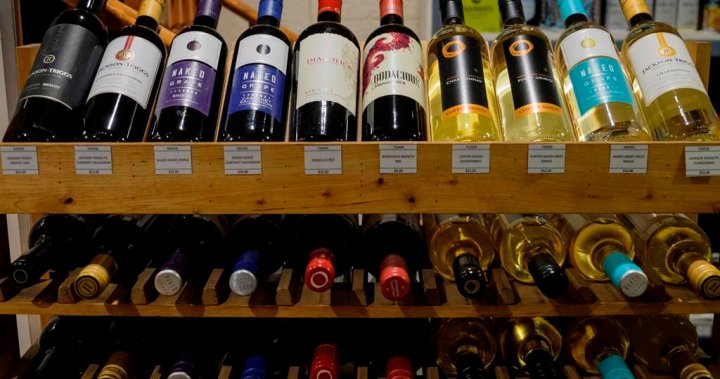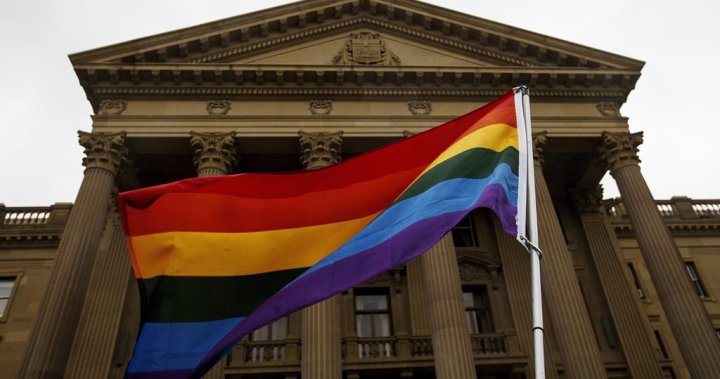British Columbia’s public safety minister won’t spill details on efforts to resolve an ongoing wine spat with Alberta, other than to confirm his staff are in direct talks with the prairie province.
Mike Farnworth said Tuesday he wants a “fair deal” that is “mutually beneficial” for both parties, but wouldn’t reveal when asked if B.C. is leaning towards any of Alberta’s most recent suggestions.
“Those are the kinds of issues that my staff are currently right now exploring with staff in Alberta,” Farnworth told Global News.
“I think where things are right now, which is at a table with both parties are talking to each other is the way we should be dealing with these kinds of challenges and disputes.”
His comments come as Service Alberta and Red Tape Reduction Minister Dale Nally proposed two conditions for allowing B.C.’s wine to be directly shipped to Alberta consumers. The first is that Alberta be able to collect the tax revenue associated with it, and the second is that B.C. open its market to Alberta craft brewers and distillers.
Farnworth said if B.C. bends on an issue Alberta is concerned about, he expects Alberta to bend as well.
“It’s slightly challenging in the sense that they don’t want direct delivery from B.C. wineries in Alberta, but what was seen to be fine was direct delivery of products that are not allowed into B.C.,” Farnworth said.
“You can’t have it both ways.”
As it stands, British Columbians ship 100-per cent Canadian wine purchased directly from a Canadian winery into the province for personal consumption.
Last month, Alberta Gaming, Liquor and Cannabis (AGLC) sent a letter to B.C. wineries telling them to stop shipping their wine directly to Alberta consumers, or it would refuse shipments of their products to Alberta restaurants and liquor stores.
Nally said Tuesday an AGLC audit found 106 B.C. wineries had been sending their products across the border that way. Direct-to-consumer shipping has never been allowed under the province’s liquor model without obtaining the appropriate Alberta liquor licence.
Get the latest National news.
Sent to your email, every day.
“We actually have craft brewers and craft distillers that can’t access the B.C. market, so clearly there’s not an equitable trade relationship here,” Nally said.
“We want to be a good neighbour and part of that is being a fair and equitable trade partner.”
Asked whether he would consider opening up access on B.C. shelves to Alberta’s breweries and distilleries, Farnworth referenced the polar vortex in January that devastated the Okanagan’s wine industry, with one report predicting up to 99-per cent crop loss for the province’s orchards this year.
“What’s important is that our wineries are facing a very difficult time right now because of the situation that we’ve had with temperature and the freezes. So for a number of them, this is important to be able to direct delivery,” he said.
“At the same time, we know there has been direct delivery to British Columbia from Alberta from products that are not currently authorized at this point.”
Last year, British Columbia’s liquor regulator reached out to the AGLC following repeated concerns that cheaper alcohol prices in Alberta have attracted an increasing number of online buyers in B.C.
It’s illegal to ship most alcohol for personal consumption from other provinces into B.C., and according to the AGLC’s Retail Liquor Store Handbook, Alberta liquor stores are not permitted to deliver liquor products to locations outside of Alberta, as per Section 4.11.1 a of the AGLC’s Retail Liquor Store Handbook.
Meanwhile, Blair Berdusco, executive director of the Alberta Small Brewers Association, said B.C.’s liquor model makes it difficult for beer from outside the province to find its way — legally — into B.C. shops. Like Nally, she would like to see more flexibility and accessibility in those rules.
“Our whole stance is make Canadian-made products available to all Canadians,” she said. “It’s not only the B.C. market we would love to be able to see everyone access, it’s every market across Canada. B.C. is one of the provinces that has some barriers to entry, but it’s not the only one.”
Like its wine, B.C.’s craft beer industry is in trouble, too, with the B.C. Craft Brewers Guild warning some 15 per cent of the province’s craft breweries could close this year without an extension on pandemic-era loans.
— with files from Jennifer Ivanov
© 2024 Global News, a division of Corus Entertainment Inc.




